
Mark Twain in Nikola Tesla’s lab 1894

Big fall, big rise and an even bigger fall.
• John Hussman Forecasts A Decade Of Stock Losses (BI)
As the equity bull market has climbed into rarefied air, investors have continuously come up with new ways to rationalize the rally. Right now, they like to cite earnings growth, which has expanded for several quarters after a prolonged rough patch. They also frequently mention interest rates that, despite hawkish signals from central banks, have remained low, supplying the market with a seemingly endless supply of cheap money. On the other side of the spectrum, John Hussman, the president of the Hussman Investment Trust and a former economics professor, thinks that the investment community is unwisely ignoring the most stretched valuations in history on the heels of a nearly 300% bull market run. Ever the outspoken bear, Hussman says investors are being willfully ignorant, which has stocks at risk of a drop that could reach 63% and send the market spiraling into a full decade of negative returns.
It wouldn’t be the first time in history this has happened. But Hussman thinks this crash will be different, because the reasons for market instability are “purely psychological” this time around, according to a recent blog post. At the root of Hussman’s pessimistic market view are stock valuations that look historically stretched by a handful of measures. According to his preferred valuation metric — the ratio of non-financial market cap to corporate gross value-added (Market Cap/GVA) — stocks are more expensive than they were in 1929 and 2000, periods that immediately preceded major market selloffs. “US equity market valuations at the most offensive levels in history,” he wrote in his November monthly note. “We expect that more extreme valuations will only be met by more severe losses.”
Those losses won’t just include the 63% plunge referenced above – it’ll also be accompanied by a longer 10 to 12 year period over which the S&P 500 will fall, says Hussman. He cites the chart below, which shows how closely 12-year expected returns for the benchmark have historically tracked Market Cap/GVA, which is shown in inverted fashion. Note that the expected trajectory for Market Cap/GVA shows the S&P 500 veering into negative territory. The psychology behind the market’s willingness to accept lofty stock valuations stems from the flawed rationale that prices are justified by low interest rates, says Hussman. To him, the US economy is growing too slowly for this to be true, and that any belief to the contrary gives people false confidence.
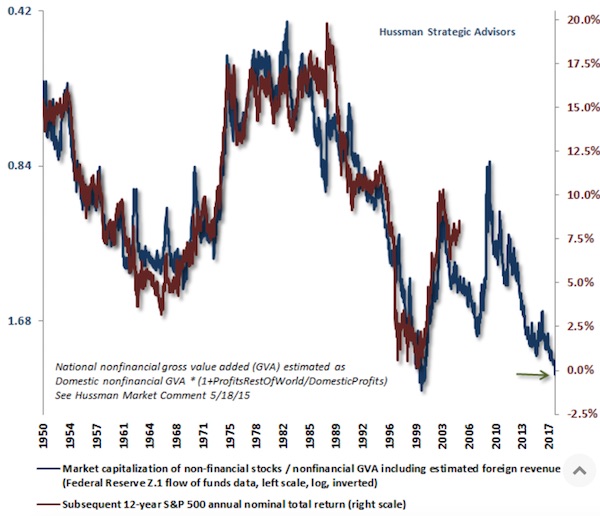

While other reports say some 70% live paycheck to paycheck. Which one is true? At least it should be clear that the US is not doing well at all.
• One In Five American Households Have ‘Zero Or Negative’ Wealth (MW)
Millions of Americans are living on the edge. One in five households has zero or negative wealth, according to a report released this week by the Institute for Policy Studies, a progressive think tank based in Washington, D.C. What’s more, an even greater share of African-American (30%) and Latino (27%) households are “underwater” financially. The combined impact of $1 trillion in credit-card debt, $1.4 trillion in student loan debt, and stagnant wages are taking a toll. U.S. homes have regained value since the Great Recession, but many households have not. “Millions of American families struggle with zero or negative wealth, meaning they owe more than they own,” the report found. “This means that they have nothing to fall back on if an unexpected expense comes up like a broken down car or illness.” And inequality could get worse through new tax cuts for the wealthy.
President Trump’s tax proposals won’t give America’s middle class the reprieve they need to grow their wealth and recover from the financial crash, said Josh Hoxie, who heads up the Project on Opportunity and Taxation at the Institute for Policy Studies. A recent analysis by the Joint Committee on Taxation concluded that taxes would decline for all income groups, with the biggest percentage-point decline for millionaires. After-tax income would rise by nearly 7% for households earning over $1 million per year, compared to less than 2% for those earning between $50,001 and $1 million, as MarketWatch recently reported. And less than 1% for those earning less than $50,000, according to Ernie Tedeschi, an economist at Evercore IS investment banking advisory firm who worked in the Treasury Department under President Obama.
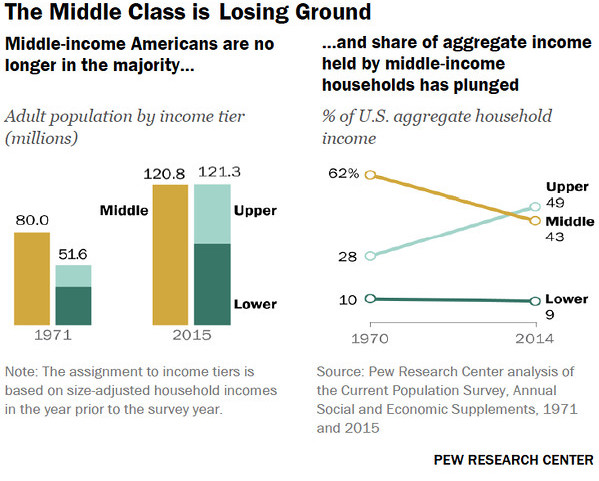
Looking at private income, such as earnings and dividends, and government benefits like Social Security, the income of families near the top increased roughly 90% from 1963 to 2016, while the income of families at the bottom rose less than 10%, according to a separate report released last month by the Urban Institute, a nonprofit policy group based in Washington, D.C., while most other groups have been left behind. And that gap between rich and poor is only going to get worse, Hoxie said. The wealthiest 25 individuals in the U.S., including co-founder Bill Gates, Amazon CEO Jeff Bezos and Facebook CEO Mark Zuckerberg, own $1 trillion in combined assets. These 25 — a group equivalent to the active roster of a major league baseball team — hold more wealth than the bottom 56% of the U.S. population.

Completely nuts.
• Top Tech Stocks’ $1.7 Trillion Gain Eclipses Canada’s Economy (BBG)
Between the FAANG quintet and China’s rivaling BAT companies, gains in the world’s top technology shares are nearing a whopping $1.7 trillion in market value this year. That’s more than Canada’s entire economy, and exceeds the worth of Germany’s biggest 30 companies put together. The eight tech giants – Facebook, Amazon, Apple, Netflix and Google parent Alphabet, as well as their Asian peers Baidu, Alibaba and Tencent – have amassed as much money in 2017 as PIMCO, one of the world’s biggest fund managers, has done in about 46 years. While the stocks have seen a meteoric rise this year, their combined market value came off highs last week amid a global selloff in which the year’s high flyers had a bigger retreat. A recent breakdown in the correlation between high-yield bonds and the tech-heavy Nasdaq 100 Index suggests the slide in junk may spread further.
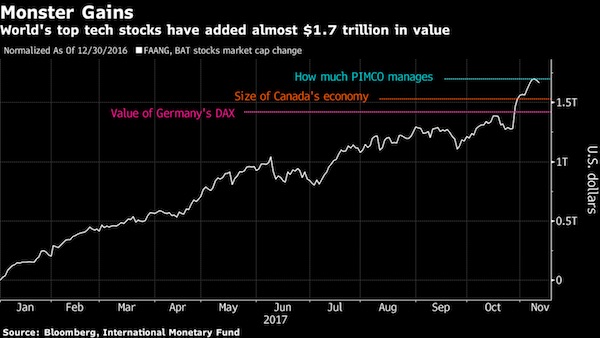

Confidence.
• Bitcoin Plunges 29% From Record High (BBG)
Bitcoin plunged as the cancellation of a technology upgrade prompted some users to switch out of the cryptocurrency, spooking speculators who had profited from a more than 800% surge this year. The cryptocurrency has dropped 9.5% since late Friday, extending its slide from last week’s record to as much as 29%, according to data compiled by Coinmarketcap.com and Bloomberg. Bitcoin cash, a rival that split from the original bitcoin in August, has jumped nearly 40% since Friday. Bitcoin cash is gaining popularity because of its larger block size, a characteristic that makes transactions cheaper and faster than the original. When a faction of the cryptocurrency community canceled plans to increase bitcoin’s block size on Wednesday – a move that would have created another offshoot – some supporters of bigger blocks rallied around bitcoin cash.
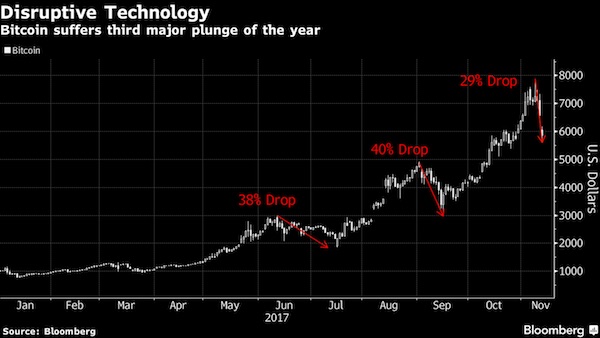
The resulting volatility has been extreme even by bitcoin’s wild standards and comes amid growing interest in cryptocurrencies among regulators, banks and fund managers. While skeptics have called bitcoin’s rapid advance a bubble, it has become too big for many on Wall Street to ignore. Even after shrinking by as much as $38 billion since Wednesday, bitcoin boasts a market value of $101 billion. Supporters of bitcoin’s technology upgrade “are now switching support to bitcoin cash,” said Mike Kayamori, head of Tokyo-based Quoine, the world’s second most-active bitcoin exchange over the past day. “There’s a panic about what’s happening. People shouldn’t panic. Just hold on to both coins until we see how it plays out.”

A different view from most.
• The End Of “The End Of History” (Luongo)
The path to draining the swamp is a circuitous one but, in my mind, it’s hard to argue where things are headed. They are not headed towards confrontation with Iran but actually the opposite. The most rabidly anti-Iranian segment of the Saudi Royal house is impoverished and imprisoned. CNN will be sold and go out of business to allow for the Time-Warner/AT&T merger. Jeff Zucker is out. Add another scalp to Steve Bannon’s belt along with Harvey Weinstein, Kevin Spacey and so many to come. Will the vestiges of the neoconservative establishment in the U.S. and Israel continue to sabre-rattle and try to undermine what is happening? Yes.
They’ve been doing that since the day Trump was elected just over a year ago, but it hasn’t stopped the momentum. Why? Because Putin was on the job outmaneuvering them at every turn. Trump made a deal with the neocons back in August to cede them control of foreign policy and, in effect, outsourced cleaning up the Middle East to Putin. But, predictably they also didn’t follow through with their end of the bargain. Trump learned, like Putin did, the John McCain’s of the world don’t keep to their deals. They are ‘not agreement capable.’ And, as such, since the last failure to repeal Obamacare Trump has gone after every pillar of support these people had. It will end with Hillary Clinton’s indictment. But in the meantime it will look like the world is on the brink of world war.

“Xi is ready to undertake reform of the financial system, which means shutting down insolvent companies and banks.”
• Warnings From the “China Beige Book” (Rickards)
The China Beige Book, CBB, says that China had been covering up and smoothing over problems related to weak growth and excessive debt in order to provide a calm face to the world in advance of the National Congress of the Communist Party of China, which took place last month. CBB also makes it clear that the much-touted “rebalancing” of the Chinese economy away from investment and manufacturing toward consumption and spending has not occurred. Instead China has doubled down on excess capacity in coal, steel and manufacturing and has continued its policy of wasteful investment fueled with unpayable debt. It’s become obvious that the first cracks are starting to appear in China’s Great Wall of Debt. The Chinese debt binge of the past 10 years is a well-known story.
Chinese corporations have incurred dollar-denominated debts in the hundreds of billions of dollars, most of which are unpayable without subsidies from Beijing. China’s debt-to-equity ratio is over 300%, far worse than America’s (which is also dangerously high) and comparable to that of Japan and other all-star debtors. China’s trillion-dollar wealth management product (WMP) market is basically a Ponzi scheme. New WMPs are used to redeem maturing WMPs, while most of the market is simply rolled over because the underlying real estate and infrastructure projects cannot possibly repay their debts. A lot of corporate lending is simply one company lending to another, which in turns lends to another, giving the outward appearance of every company holding good assets, but in which none of the companies can actually pay its creditors.
It’s an accounting game with no real money behind it and no chance of repayment. All of this is well-known. What is not known is when it will end. When will confidence be lost in such a way that the entire debt house of cards crumbles? When will a geopolitical shock or natural disaster trigger a loss of confidence that ignites a financial panic? There was little prospect of this in the past year because President Xi Jinping was keeping a lid on trouble before the recently concluded National Congress of the Communist Party of China. With the congress behind him, Xi is ready to undertake reform of the financial system, which means shutting down insolvent companies and banks. Now the first bankruptcies have begun to appear.

None of these people give one hoot about their country. They care about themselves only.
• UK Government Tensions Rise After Leak Of ‘Orwellian’ Memo Sent To May (G.)
The tensions in Theresa May’s government intensified on Sunday night ahead of this week’s vital votes on the Brexit bill, as ministers accused Boris Johnson and Michael Gove of sending an “Orwellian” set of secret demands to No 10. As an increasingly weakened prime minister faces the possibility of parliamentary defeats on the bill, government colleagues have said they are aghast at the language used by the foreign secretary and the environment secretary in a joint private letter. The leaked letter – a remarkable show of unity from two ministers who infamously fell out during last year’s leadership campaign – appeared to be designed to push May decisively towards a hard Brexit and limit the influence of former remainers. It complained of “insufficient energy” on Brexit in some parts of the government and insisted any transition period must end in June 2021 – a veiled attack on the chancellor, Philip Hammond.
They urged the prime minister to ensure members of her top team fall behind their Brexit plans by “clarifying their minds” and called for them to “internalise the logic”. But the leak drew a bitter response from supporters of a soft Brexit, who suggested that May would now be forced to either discipline the pair or further weaken her position, which has already been tested by the recent resignations of Priti Patel and Michael Fallon and continuing pressure on Johnson and Damian Green. One cabinet minister told the Guardian: “It is not surprising that they [Gove and Johnson] would express their view. But what is surprising is that they would write this down and use this kind of language in a letter to the prime minister. “Some have described it as Orwellian, and it is. It is not helpful when people try and press their views in untransparent way.”

It’s just starting. London falling.
• More Than A Third Of UK Home Sellers Cut Asking Price (G.)
More than a third of home owners trying to sell their house have been forced to reduce their asking price, with the number of price cuts at their highest level since 2012, according to Rightmove. Traditionally house sellers are often forced to cut asking prices in the pre-Christmas period but this year the nation appears to be holding a collective autumn sale, said the property website. Rightmove, which claims to list 90% of the houses being sold in the UK, said 37% of current sellers had dropped their asking price, with a typical 0.8% or £2,392 price reduction. It also warned that those who recently put their property on the market were being too optimistic by not discounting by more. The mass price cut will be seen as further evidence that the market has slowed dramatically, particularly in London where prices have been falling.
Last week the Royal Institution of Chartered Surveyors said the overall UK property market had stalled. Rics also warned that it expected the market to remain subdued in the coming months as sales stay flat or fall in most regions. Rightmove director, Miles Shipside, said the slowdown in the housing market, the recent interest rate rise and the prediction that further rises were on the horizon suggested bigger reductions in house prices in the near future. “Given that the market has been price-sensitive for a while and a five-year high proportion of sellers are slashing their prices, some sellers and their agents are over-pricing. These sellers may well be asking themselves if they could have saved some time and stress by pricing a lot more conservatively at the start.”

As you’re being pleasantly entertained with that dumb Paris agreement.
• Fossil Fuel Burning Set To Hit Record High In 2017 (G.)
The burning of fossil fuels around the world is set to hit a record high in 2017, climate scientists have warned, following three years of flat growth that raised hopes that a peak in global emissions had been reached. The expected jump in the carbon emissions that drive global warming is a “giant leap backwards for humankind”, according to some scientists. However, other experts said they were not alarmed, saying fluctuations in emissions are to be expected and that big polluters such as China are acting to cut emissions. Global emissions need to reach their peak by 2020 and then start falling quickly in order to have a realistic chance of keeping global warming below the 2C danger limit, according to leading scientists. Whether the anticipated increase in CO2 emissions in 2017 is just a blip that is followed by a falling trend, or is the start of a worrying upward trend, remains to be seen.
Much will depend on the fast implementation of the global climate deal sealed in Paris in 2015 and this is the focus of the UN summit of the world’s countries in Bonn, Germany this week. The nations must make significant progress in turning the aspirations of the Paris deal into reality, as the action pledged to date would see at least 3C of warming and increasing extreme weather impacts around the world. The 12th annual Global Carbon Budget report published on Monday is produced by 76 of the world’s leading emissions experts from 57 research institutions and estimates that global carbon emissions from fossil fuels will have risen by 2% by the end of 2017, a significant rise.
“Global CO2 emissions appear to be going up strongly once again after a three-year stable period. This is very disappointing,” said Prof Corinne Le Quéré, director of the Tyndall Centre for Climate Change Research at the UK’s University of East Anglia and who led the new research. “The urgency for reducing emissions means they should really be already decreasing now.” “There was a big push to sign the Paris agreement on climate change but there is a feeling that not very much has happened since, a bit of slackening,” she said. “What happens after 2017 is very open and depends on how much effort countries are going to make. It is time to take really seriously the implementation of the Paris agreement.” She said the hurricanes and floods seen in 2017 were “a window into the future”.
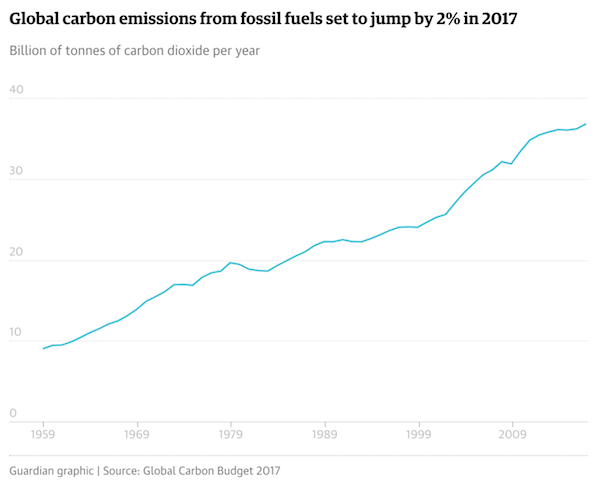

Farmers are using dicamba because they get it on their crops anyway from the neighbors. There’s not much time left to stop Monsanto from effectively owning all our food.
• The Decisions Behind Monsanto’s Weed-Killer Crisis (R.)
In early 2016, agri-business giant Monsanto faced a decision that would prove pivotal in what since has become a sprawling herbicide crisis, with millions of acres of crops damaged. Monsanto had readied new genetically modified soybeans seeds. They were engineered for use with a powerful new weed-killer that contained a chemical called dicamba but aimed to control the substance’s main shortcoming: a tendency to drift into neighboring farmers’ fields and kill vegetation. The company had to choose whether to immediately start selling the seeds or wait for the U.S. Environmental Protection Agency (EPA) to sign off on the safety of the companion herbicide. The firm stood to lose a lot of money by waiting.
Because Monsanto had bred the dicamba-resistant trait into its entire stock of soybeans, the only alternative would have been “to not sell a single soybean in the United States” that year, Monsanto Vice President of Global Strategy Scott Partridge told Reuters in an interview. Betting on a quick approval, Monsanto sold the seeds, and farmers planted a million acres of the genetically modified soybeans in 2016. But the EPA’s deliberations on the weed-killer dragged on for another 11 months because of concerns about dicamba’s historical drift problems. That delay left farmers who bought the seeds with no matching herbicide and three bad alternatives: Hire workers to pull weeds; use the less-effective herbicide glyphosate; or illegally spray an older version of dicamba at the risk of damage to nearby farms.
The resulting rash of illegal spraying that year damaged 42,000 acres of crops in Missouri, among the hardest hit areas, as well as swaths of crops in nine other states, according to an August 2016 advisory from the U.S. Environmental Protection Agency. The damage this year has covered 3.6 million acres in 25 states, according to Kevin Bradley, a University of Missouri weed scientist who has tracked dicamba damage reports and produced estimates cited by the EPA. The episode highlights a hole in a U.S regulatory system that has separate agencies approving genetically modified seeds and their matching herbicides.
Monsanto has blamed farmers for the illegal spraying and argued it could not have foreseen that the disjointed approval process would set off a crop-damage crisis. But a Reuters review of regulatory records and interviews with crop scientists shows that Monsanto was repeatedly warned by crop scientists, starting as far back as 2011, of the dangers of releasing a dicamba-resistant seed without an accompanying herbicide designed to reduce drift to nearby farms.

“Farmers need it desperately,” said Perry Galloway. “If I get dicamba on (my products), I can’t sell anything,” responded Shawn Peebles.”
• Weed-Killer Prompts Angry Divide Among US Farmers (AFP)
When it comes to the herbicide dicamba, farmers in the southern state of Arkansas are not lacking for strong opinions. “Farmers need it desperately,” said Perry Galloway. “If I get dicamba on (my products), I can’t sell anything,” responded Shawn Peebles. The two men know each other well, living just miles apart in the towns of Gregory and Augusta, in a corner of the state where cotton and soybean fields reach to the horizon and homes are often miles from the nearest neighbor. But they disagree profoundly on the use of dicamba. Last year the agro-chemical giant Monsanto began selling soy and cotton seeds genetically modified to tolerate the herbicide. The chemical product has been used to great effect against a weed that plagues the region, Palmer amaranth, or pigweed – especially since it became resistant to another herbicide, glyphosate, which has become highly controversial in Europe over its effects on human health.
The problem with dicamba is that it vaporizes easily and is carried by the wind, often spreading to nearby farm fields – with varying effects. Facing a surge in complaints, authorities in Arkansas early this summer imposed an urgent ban on the product’s sale. The state is now poised to ban its use between April 16 and October 31, covering the period after plants have emerged from the soil and when climatic conditions favor dicamba’s dispersal.
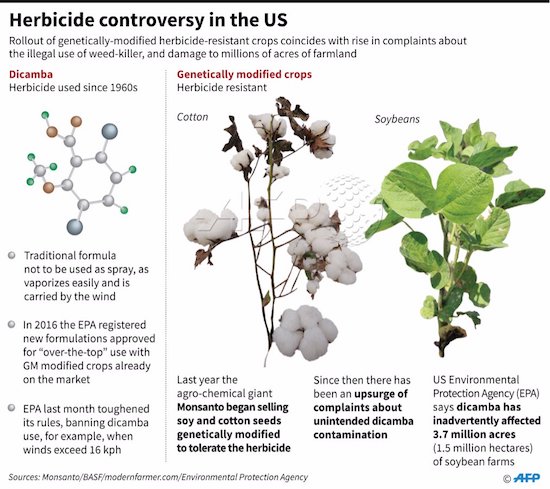

This is who we are. This is caused by people we support, that we call our friends.
• Millions On Brink Of Famine In Yemen As Saudi Arabia Tightens Blockade (G.)
Abdulaziz al-Husseinya lies skeletal and appears lifeless in a hospital in Yemen’s western port city of Hodeidah. At the age of nine, he weighs less than one and a half stone, and is one of hundreds of thousands of children in the country suffering from acute malnutrition. Seven million people are on on the brink of famine in war-torn Yemen, which was already in the grip of the world’s worst cholera outbreak when coalition forces led by Saudi Arabia tightened its blockade on the country last week, stemming vital aid flows. Al-Thawra hospital, where Abdulaziz is being treated, is reeling under the pressure of more than two years of conflict between the Saudi-led coalition and Iranian-allied Houthi rebels. Its corridors are packed, with patients now coming from five surrounding governorates to wait elbow-to-elbow for treatment.
Less than 45% of the country’s medical facilities are still operating – most have closed due to fighting or a lack of funds, or have been bombed by coalition airstrikes. As a result, Al-Thawra is treating some 2,500 people a day, compared to 700 before the conflict escalated in March 2015. [..] Aid agencies are now warning that Yemen’s already catastrophic humanitarian crisis could soon become a “nightmare scenario” if Saudi Arabia does not ease the blockade of the country’s land, sea and air ports – a move that the kingdom insists is necessary after Houthi rebels fired a ballistic missile towards Riyadh’s international airport this month. United Nations humanitarian flights have been cancelled for the past week and the International Committee of the Red Cross (ICRC), along with Médecins Sans Frontières (MSF), have been prevented from flying vital medical assistance into the country.
More than 20 million Yemenis – over 70% of the population – are in need of humanitarian assistance that is being blocked. Following international pressure, the major ports of Aden and Mukalla were reopened last week for commercial traffic and food supplies, along with land border crossings to neighbouring Oman and Saudi Arabia, but humanitarian aid and aid agency workers remained barred from entering the country on Sunday. UN aid chief Mark Lowcock has said if the restrictions remain, Yemen will face “the largest famine the world has seen for many decades, with millions of victims”.









Home › Forums › Debt Rattle November 13 2017